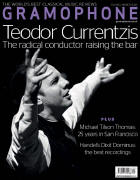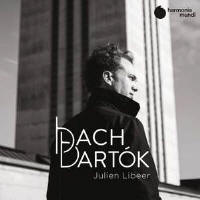Texte paru dans: / Appeared in: |
|
|
Outil de traduction (Trčs approximatif) |
|
|
Reviewer: Jed Distler Julien Libeer’s Bach takes full advantage of the modern concert grand’s dynamic and timbral resources while keeping within stylistically acceptable parameters. The G major French Suite receives a lovely performance, featuring imaginative embellishments in the Allemande’s repeats, terraced textures in the Courante and a Sarabande where the melody spins fetchingly over lute-like support in the left hand. Note, too, the Loure’s intriguingly differentiated arpeggiated chords and embellishments, plus a Gigue that goes like the wind. While most pianists play the introduction to the C minor Partita’s Sinfonia loudly and assertively, Libeer’s unconventionally mellow vantage point allows for an assiduous transition into the movement’s main section. His leisurely Allemande is suave yet uneventful compared to the more intricate phrasing in Igor Levit’s similarly paced interpretation (Sony, 10/14). The remaining inner movements continue along an understated trajectory, but Libeer’s brisk and incisively articulated Capriccio will wake you up! In the first movement of Bartók’s Out of Doors suite, Libeer adheres closer to the composer’s Pesante directive, allowing the themes and percussive accents room to breathe and to interact. Libeer’s ‘Barcarolla’ is slower and stricter next to the animated lilt of Beatrice Rana (Harmonia Mundi, 2/14) and Florent Boffard (Mirare, 1/19), and he arguably underplays the tangy dissonances of the ‘Musettes’. Yet Libeer gauges the delicate clusters and slow octave cantabiles of ‘The Night’s Music’ with shimmering impact, and juggles the polyrhythmic strands in ‘The Chase’ with the utmost control and clarity, while keeping the momentum alive. The opening Allegretto of Bartók’s Op 14 Suite makes an elegant impression in Libeer’s hands but I hear more idiomatic tartness in the angular, speech-like phrasing of Jeno˝ Jandó (Naxos, 11/01) and Zoltán Kocsis (Philips, 11/94). He navigates the Scherzo’s subtle tempo changes perfectly, yet his marcatissimo declamations lack the nervous energy of Géza Anda’s wonderful broadcast recording (Audite, 10/08). The last two movements, however, benefit from Libeer’s full-bodied sonorities and sensitivity to the composer’s harmonic resonances. Like most pianists, Libeer makes a short separation between the third and fourth movements, ratherthan eliding them attacca as Bartók’s score indicates. A pity, for this seamless transition is quite effective as heard in Jandó’s recording and, of course, in the composer’s own 78rpm rendition. A pretentious booklet essay presents a high-handed, sloppily argued case for programming Bach and Bartók suites backto-back on the present disc, but you can ignore it and simply focus on the best of what Libeer has to offer. |
|




